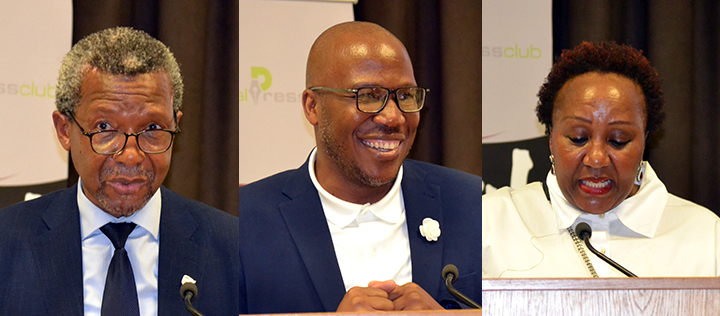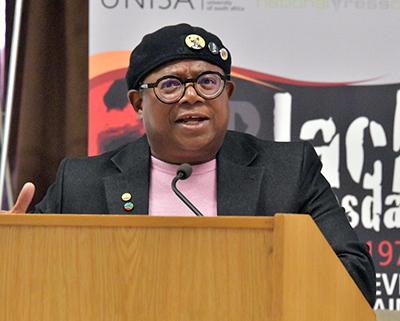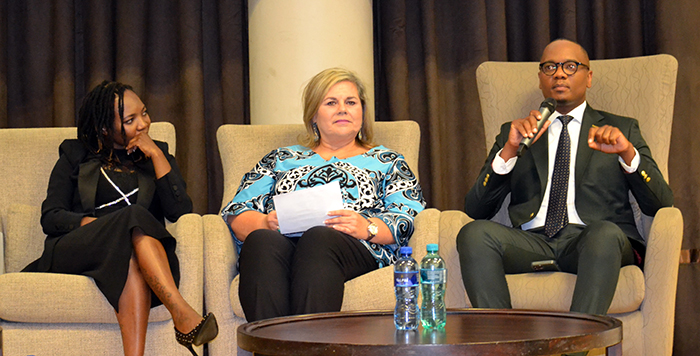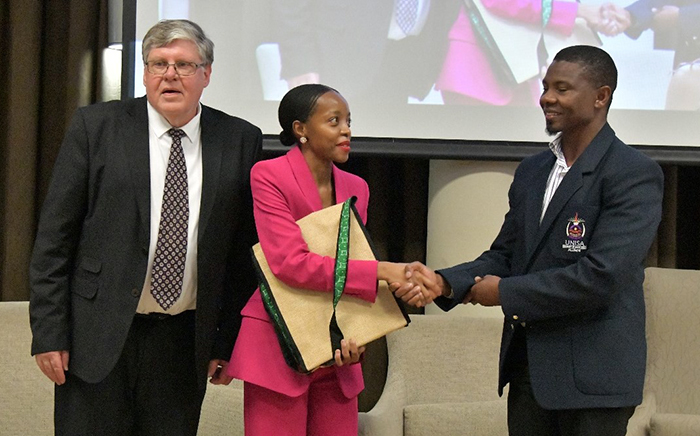News & Media
Preserving the legacy of an inimitable media giant
Themed "Ethical journalism versus survival of journalism", the National Press Club, in partnership with Unisa and the Qoboza family, held the 13th Percy Qoboza Memorial Lecture to preserve the legacy of the late vocal icon. The lecture was commemorated on 19 October 2023 at Unisa's Muckleneuk Campus, marking the 46th anniversary of Black Wednesday when the apartheid regime silenced independent voices by closing certain publications on the same day in 1977.

From the left: Prof Solomon Magano, Kennedy Mudzuli and Thokozile Qoboza
Welcoming attendees to this august gathering, Professor Solomon Magano, Unisa's Acting Vice-Principal of Institutional Development, acknowledged Qoboza as a legend worthy of being celebrated. Magano recalled that the lecture was extraordinary as it was held in a year that the university celebrated its 150th anniversary. He further indicated that the partnership towards the lecture must be cherished. He also remarked that Unisa, an institution of higher learning whose core mission included knowledge generation and thought leadership, was delighted to hear media practitioners' insightful and robust discussions.
Signifying intact reputation and ethics
Kennedy Mudzuli, Deputy Chairperson of the National Press Club, maintained that it was important for individuals to build valuable reputations that left a mark to be celebrated. He added: "The issue of reputation has brought us together in this lecture; therefore, icons such as Qoboza, the late South African musician Lucky Dube and the late South African former President Nelson Mandela are remembered for their invaluable contributions to society, and their reputations were intact."
Appreciating the unwavering annual celebration of Qoboza's memory, Thokozile Qoboza, the daughter of the late Percy Qoboza, maintained: "My father loved his country, but he loved his fellow black people more." She added: "The fact that black people were marginalised and oppressed motivated him to fight for them through his writing." Qoboza said that her father was a mouthpiece for those who spoke against apartheid and that he was ethically vocal.

Sandile Memela
Upholding moral journalism; redefining media's role
Keynote speaker Sandile Memela, seasoned journalist, author, cultural critic and civil servant, contextualised how Qoboza generated revenue for the media organisations that employed him but prioritised writing truth-to-power. He remarked: "Percy Qoboza was an enemy of the apartheid regime as he was unapologetically vocal and upheld moral journalism." Memela also expressed that today, journalists, consciously or not, side with political factions or parties to get stories without upholding objectivity and write from a particular perspective. "Also," he continued: "newspapers had to tread carefully about writing stories against corporations that brought advertising revenue for them.
According to Memela, the media were part of the oppressive system that was fought against, and they no longer wrote stories for mental liberation but for intellectual enslavement to perpetuate the economic system. He, therefore, questioned: 'Whose interests do the media serve? Additionally, Memela pointed out that today, black people own the media, but the industry remains the least transformed as they cover stories similar to how they were covered previously.
Memela described Qoboza as an influential and powerful thinker, writer, and a renowned critic of apartheid; hence, the apartheid police detained him. He reiterated that it was essential to acutely re-examine black newspapers' and editors' roles and relevance. Memela strongly spoke against publications that diluted radical black voices. He further urged that it was essential to question who developed the news that the society consumed and their purpose, therefore questioning the role of post-apartheid media.
Memela also encouraged that Qoboza's biography must be documented as he possessed a vital voice that must be heard and preserved. Further, he criticised market-oriented media that do not prioritise people's rights. He remarked: "The role of the media must be redefined."

Panellists (from the left): Prof Rofhiwa Mukhudwana, Irma Green and Aldrin Sampear
Protecting news integrity and people's rights through the media
During a robust panel discussion, Aldrin Sampear, South African Broadcasting Corporation and SAFM's journalist, said that it was important for the media to be commercialised without compromising the integrity of the news and infringing on people's rights. Additionally, Irma Green, Group Editor of Caxton Local Media, remarked that the media must cover community narratives and encouraged higher education institutions to help journalism and communication students understand the cause of journalism. Speaking about cyber mobs, Professor Rofhiwa Mukhudwana, Unisa's Acting Chair of the Department of Communication Science, noted that the audience decided the survival of media organisations, adding that journalists no longer have the monopoly over news.

Prof Danie du Plessis (Left: Unisa’s Communication Science Department) and Lloyd Modjadji (Right: Unisa’s Foundation and Alumni Relations office) handing the Patrick Hlahla Bursary to recipient, Bongiwe Ndebele (centre)
During the lecture, Unisa's Department of Communication Science showcased its digital communications newsletter as part of an engaged scholarship initiative. Also, the Unisa Foundation and Alumni Relations office presented the Patrick Hlahla (former Chairman of the National Press Club) Bursary to an illegible Unisa student, Bongiwe Ndebele, who is studying for a postgraduate degree in communications. The bursary highlighted Unisa's commitment to the continuous development of journalism and communication.
In closing, Professor Siyasanga Tyali, Unisa's Acting Director of the School of Arts, recognised that Qoboza was an influential media practitioner who worked under harsh conditions during the apartheid era. He concluded: "Qoboza was a shining example of the commitment to activist journalism."
Click here to watch a video recording of the 13th Percy Qoboza Memorial Lecture.
#Unisa150
* By Nancy Legodi, Acting Senior Journalist, Department of Institutional Advancement
Publish date: 2023/10/20

 Unisa co-hosts G20 community outreach in the Eastern Cape
Unisa co-hosts G20 community outreach in the Eastern Cape
 Unisans gain membership of prestigious science academies
Unisans gain membership of prestigious science academies
 Advocating for disability transformation through servant leadership
Advocating for disability transformation through servant leadership
 Unisa Press continues to illuminate the publishing space
Unisa Press continues to illuminate the publishing space